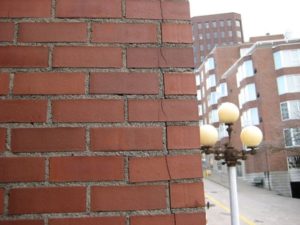
Whether we’re talking about DIY or professional masonry, there are certain mistakes and missteps that can adversely affect the quality of the work, leading to problems later on. This may seem like a minor thing, but poor quality masonry can be very problematic for homeowners, and can lead to spiraling repair and renovation costs. By learning about some of the common masonry problems that occur, it’s possible to avoid them and ensure a higher quality masonry for your home or business.
1. Compaction
This occurs when the foundation of the masonry work begins to sink and settle down, or “compact” against each other. This is problematic because the structure starts to sag and lose integrity. It’s possible to repair compacted sections of masonry work, but there are situations in which the compaction is too severe and a process of demolition and rebuilding becomes necessary.
2. Cracks
There are different types of cracks in masonry, including “step” cracks and “vertical corner” cracks. Step cracks are usually a result of an aging or faulty foundation, and as it settles down, cracks begin to form throughout the masonry work, resembling a “step” pattern. Vertical cracks are often a result of problems in the soil (such as drying or cracking) around the base of the construction. Having a professional check your foundation every year is a good way to stay on top of these problems, and in many cases, minor foundation repairs can be achieved without too much time or cost. It’s also worth mentioning that faulty gutters and downspouts can cause problems with the foundation of your masonry, so keeping your gutter systems in good working order is a great idea.
3. Bulging
If the masonry work becomes corroded, or is frequently exposed to running water (i.e. the ground around the base of the structure is saturated with water), bulging can occur. This is also possible with low-quality bricks or poor-quality masonry work. In order to find out what’s causing the bulge in your brick walls, you’ll need to have an expert mason come and check it out.
Ensuring the best quality masonry
Whether it’s chimney work, an exposed brick surface, or any other aspect of masonry in your home or business, it’s important to get it right. Unless you have substantial experience and training with masonry, higher level projects are going to involve hiring a professional — and here’s where it gets interesting. The skill and reputation of the mason you hire will have a direct effect on the quality and longevity of the work. Avoiding common masonry problems really is a one-step process, provided you locate and hire a truly qualified and reputable masonry specialist in your area.
